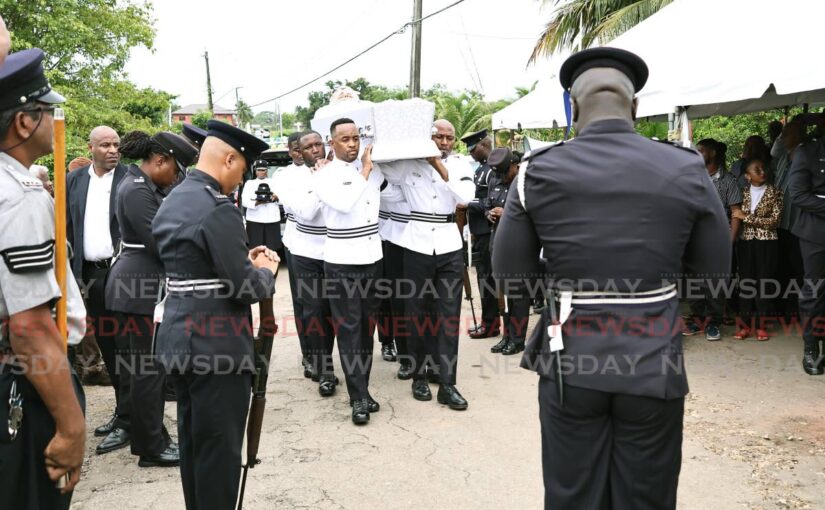Six years after homes slipped into sea, Cedros families no closer to HDC home ownership
 24 November 2024
24 November 2024
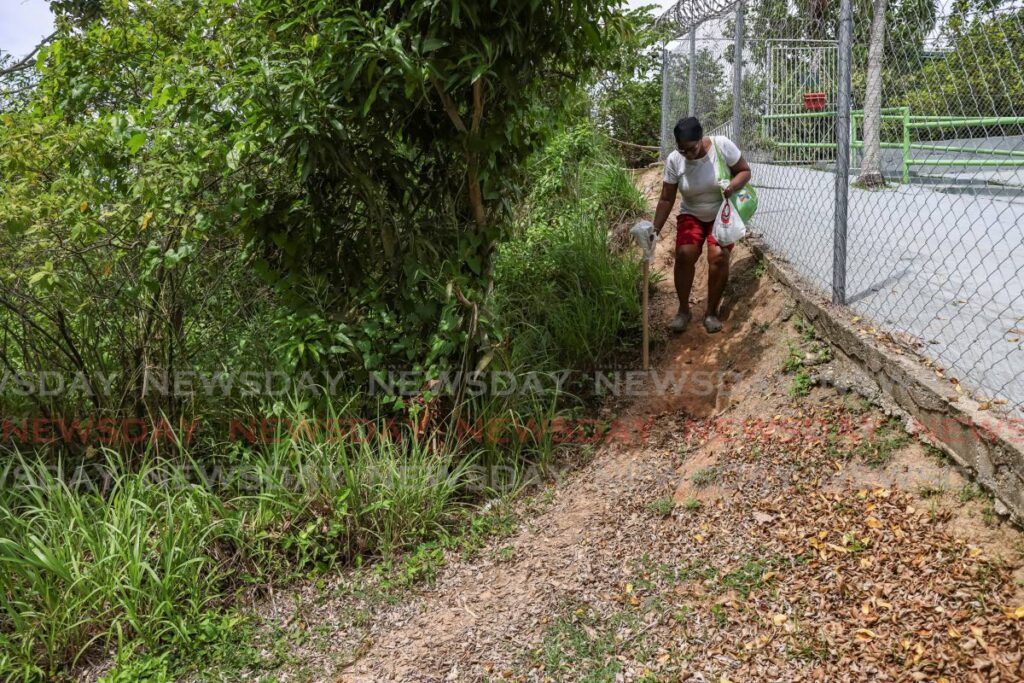

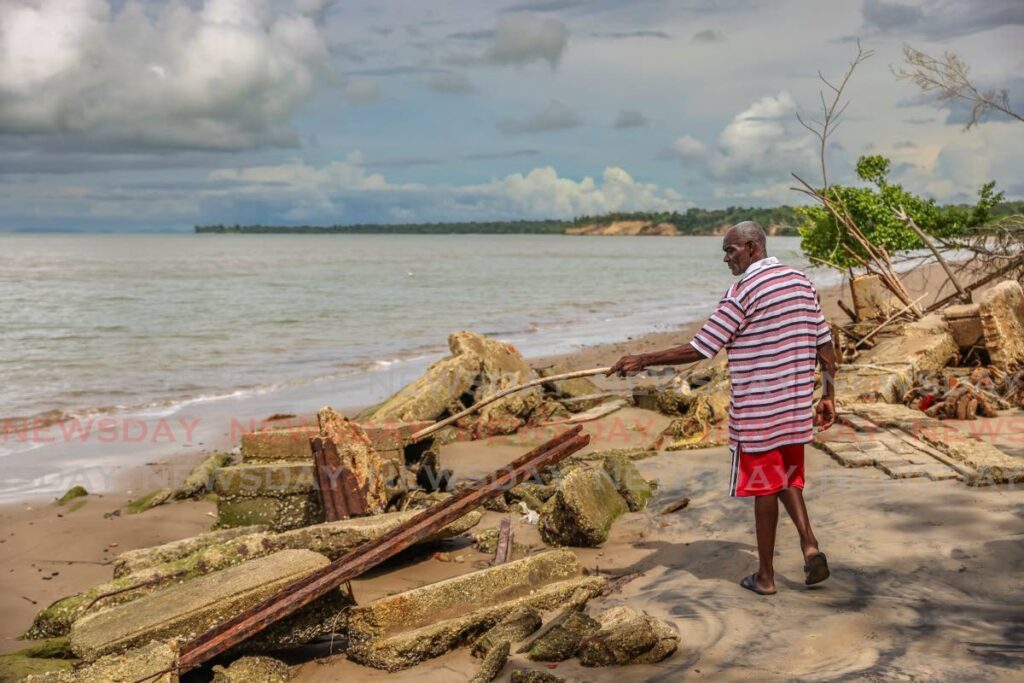
LITTERED along the beach at Bamboo Village, Cedros, are the remnants of the home Kareem Mohammed once shared with his family.
The family's electricity pole, beams that once held up their roof, pieces of the foundation, two concrete staircases, electrical wiring and piping and a large chunk of their gallery, with the pretty cream-and-brown tiles still intact, have almost become part of the shoreline, as the shifting tide covers these relics with sand.
A ten-minute hike from the area where their house stood almost seven years ago, through tall grass and bushes, took the Sunday Newsday team to the beachfront.
The well-used track was created when Mohammed's home slid off the hillside in February 2018, bringing national attention to the previously quiet seaside community.
In the aftermath of that traumatic day, Mohammed and his family were relocated to the Lake View Housing Corporation complex in Point Fortin, where they still live.
>
Mohammed's family was one of seven evacuated and moved to Lake View.
In an interview with Sunday Newsday at his home, Mohammed, 29, recalled the terrifying moments that led to the destruction of his childhood home.
"It was so traumatic when it happened.
"What I could remember was the ground was shaking and everybody just had to run at the moment of it. Because, while like pieces of the walls were falling and crumbling and whatnot, like neighbours around were trying to help us to remove things from the house and like put it on the side of the road. But within that, it's like a quick moment where everything just started to shake and everybody started run, like you run for life.
"And then we saw like the road started to crack open. It was like a scene from a movie, basically."
His parents still visit where their house once stood, looking on as more pieces of the hillside slip into the sea.
"Mom and Dad, they go every week, every day – almost every day – when they get a chance, they go. Because that's the only place that they feel comfortable, that they feel at home, you know."
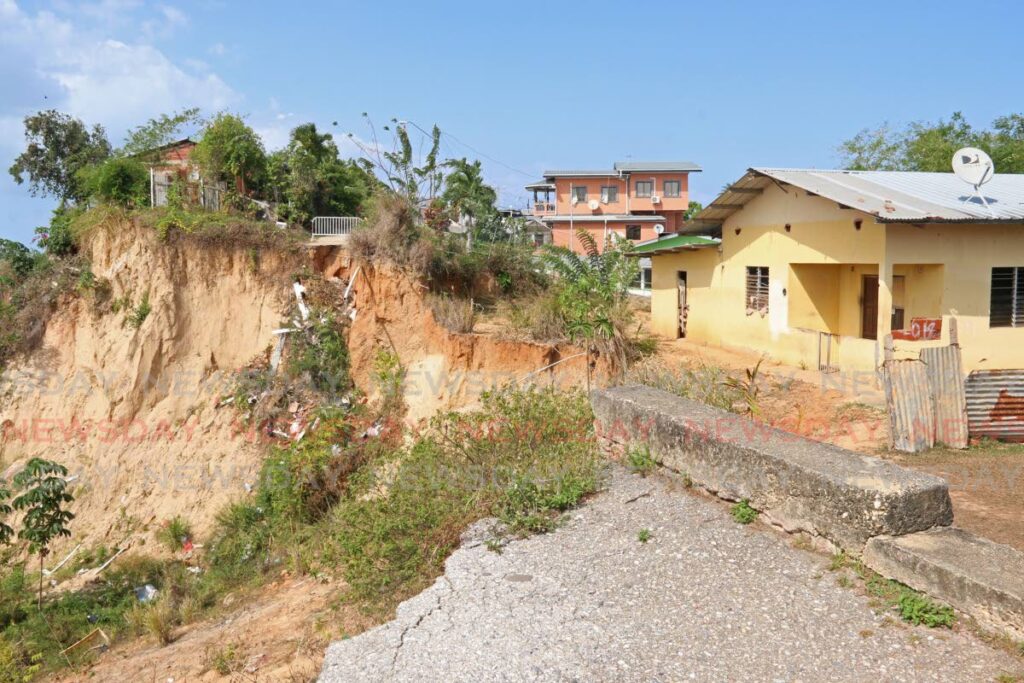
Mohammed has accepted the change in lifestyle from moving from the countryside, but he too longs to return to Cedros.
>
"I would love to be there as well. That's where I grew up and that's where I know as home as well."
Life in Lake View has also been difficult for his family, as their new home came with its own suite of issues.
Mohammed's mother Charmion Gunness showed Sunday Newsday stains on the walls from what she said were leaking sewer lines. She said there were two sewer pipes in front of her door that overflow from time to time and a third in her kitchen that often overflows.
She said numerous reports to the Housing Development Corporation (HDC) yielded no responses.
Mohammed surmised this was owing to the family's unknown status with HDC.
He said the family had an agreement to occupy the townhouse.
"I don't know if it's because of our status...because we are occupying, and it's not ours, that they tend to push us back down the list from fixing certain things. But there have been a number of issues."
He said these would be costly for the family to repair on their own.
"And it doesn't make sense that we putting out money to fix certain things and at the end of it...the property is not ours, you know.
>
"So that's a concern that I am having, that Mom is having, that the other neighbours probably having as well. We don't know our status here. If we are here to stay, if it's temporary – it's been over six years – we are still under something temporary. We don't know what the future would hold for here. They could come tomorrow and say, you know what, we have to move.
"Where are we going to go?"
Korisha Sumesarai and her family were also evacuated from Cedros. She lived obliquely opposite Mohammed's family. While most of her home is still standing, it was deemed unsafe to occupy and her family was also relocated to Lake View.
The land she inherited from her parents is now overgrown, and the house she left behind is barely visible from the road. The area has become a dumping ground for other residents, and various household items and garbage are strewn around the house and surrounding grass.
Sumesarai said up until several months ago, she would visit to cut the grass, but now she is letting nature take its course.
When Sunday Newsday visited, she was preparing chataigne for a friend who was ailing.
As her fingers deftly separated the flesh from the seeds, she explained HDC told her family about a rent-to-own option.
But she said her husband did not have a permanent job, and with her health challenges, her family can barely make it through the month, so they have never paid anything to HDC.
Sumesarai said losing her home and being relocated from her childhood playground landed her in hospital when the landslide happened, but since then, she has settled into her new home.
>
But she is fearful that one day HDC may come knocking for what she cannot afford to pay and she may find herself on the street.
"I wouldn't lie and say something that was not true. We didn't pay anything. So I don't know what could happen."
She said promises by various officials to find land for the relocated families were never formalised.
She explained that country life was easier for her family, as they could find food from the land or the sea if money was tight.
"You could go and catch fish, ask somebody for a hand of fig. But up here, everything you have to buy, so it tough on us."
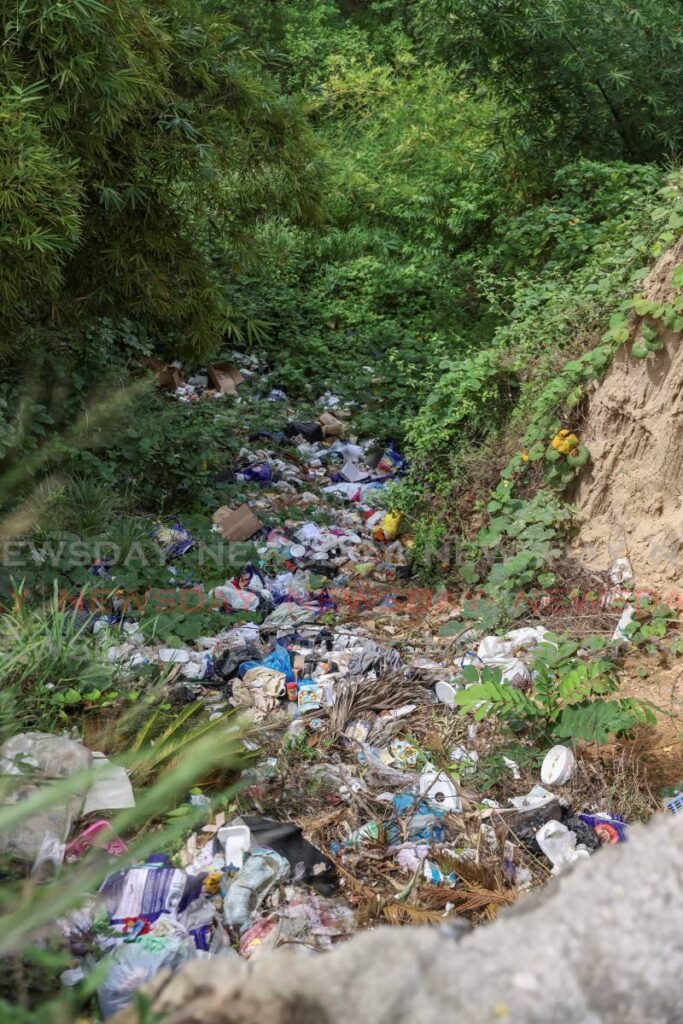
Marilyn Samuel, the matriarch of another family relocated from Cedros, said her family was able to formalise an agreement with HDC to rent-to-own their townhouse. She said she has adapted well to the Lake View community.
She lived directly opposite Mohammed in Bamboo Village. Her once-pristine house has been boarded up and is surrounded by tall grass. A homeless man, known only by his alias, "Gow," has made the abandoned building his home.
As the land continued to slide silently down the hillside over the years, it is now almost at the front door of Samuel's former home. Other villagers have made a track.
>
Samuel said for several years, she went to then-MP Edmund Dillon to find out if anything would be done to stop the land from slipping further. She said she also visited current MP Kennedy Richards several times about the status of repairs but never got a definitive answer.
While she was still interested in returning to Cedros, she was more comfortable at Lake View.
But she said her family was also experiencing numerous issues with their townhouse.
"The toilet upstairs was leaking all over the wall and we had to fix it.
"Now, when rain falling, water coming inside the house. When rain fall just last week, all here was flood."
Samuel said she had made numerous reports to HDC, but no one had responded. She said an official told her in 2018 that land to relocate the seven families back to Cedros would be too expensive.
But, she said, "Once we get the problems fix, we could live comfortable here."
In response to queries, HDC's communications manager Kimberly De Souza said in a statement on November 22, the HDC was aware of the concerns raised by the Lake View tenants.
It said in October 2018, "the HDC provided emergency housing to the four persons whose houses were destroyed due to land slippage in the Cedros area."
It said the relocation was for three months.
"The HDC is currently regularising this community with an estimated first-quarter 2025 commitment to close. We have received several documents which will bring our residents closer to home ownership status.
"As a consequence, persons who are without legal agreements with the HDC for example, licence to occupy (LTO) – a hybrid mortgage arrangement for HDC’s properties awaiting final approvals – and/or rental documents, are advised to visit the HDC head office, located at 44-46 South Quay, Port of Spain, to complete the process."
About the complaints on the building, HDC said it was "reminding" homeowners that houses require "maintenance based on continuous use.
"As a consequence, the HDC addresses structural issues within its developments or those that arise in the common areas, which do not occur from personal use."
Shifting land, constant fear
Bryan Joseph has lived in Bamboo Village, Cedros, for most of his 60 years.
He had just returned from his job at the Nalis Library in Point Fortin in 2018 and was trying to relax when he heard a loud rumble.
Before he could move to investigate, his brother Sheldon called out to him that the hillside was crumbling.
He ran outside and joined the other villagers who had assembled in the road to watch the Mohammeds' home slide down the hillside.
Joseph's brother, Leroy Joseph, and his family were also relocated to Lake View, as their home was deemed unsafe.
Joseph said Leroy grieved for his home until he died in 2022.
"My brother took it on. That hurt him...you wouldn't believe. He came back here most about three times since that happened, and the last time he came back here (was) just before he died. He came back here and they keep a birthday party for him. And after that he get sick, because he did now build his house.
"He had not too long retired, get his money – he told me about $350,000 he had already spent on his house and to see that it gone sort of break him."
Joseph family's home remains on the edge of the precipice created by the shifting earth.
He recalled visits by the Prime Minister, Works Minister Rohan Sinanan and various other officials in the aftermath of the landslide.
But he said in recent years, no one has come to assess the site or speak to the remaining residents.
"The problem lies with the people in charge, people with the authority...They talk, talk, talk, talk and no work. But faith without work is death. And I always believe in less talk and more work.
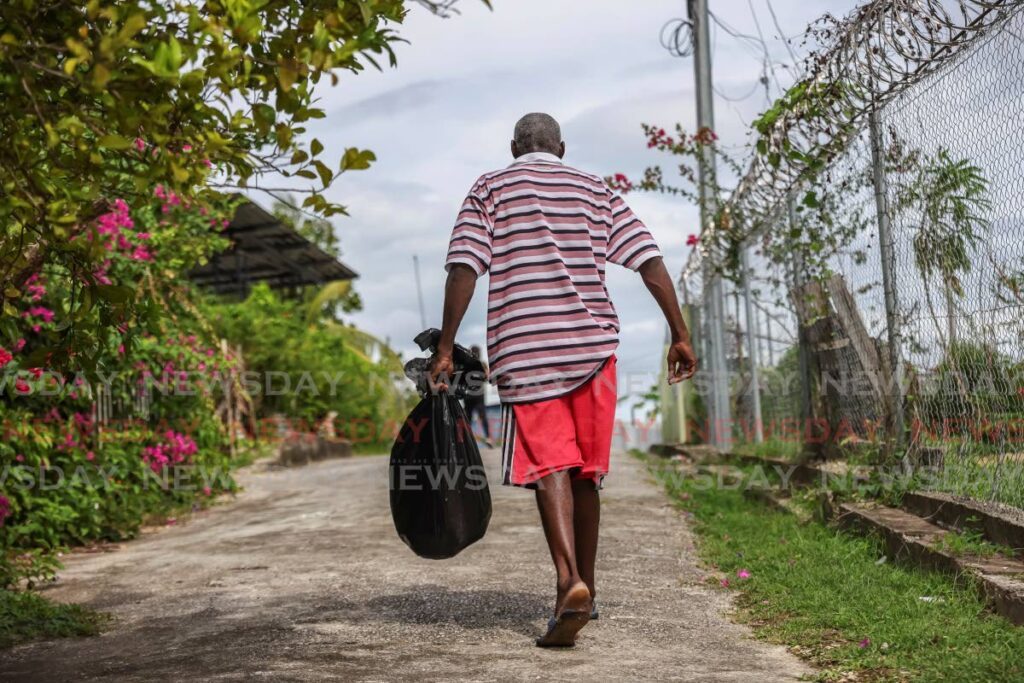
"If you promise to do something, as a big man, as a councillor or as a minister or as a project manager, and you give your word, you supposed to stand by it and do something or come and say, 'Well, we will not be able to fix now, but we looking into it.' And every so often you come down and make a check."
Joseph said from time to time, pieces of the newly formed hillside collapse. He believes his family home will one day fall victim to it.
Again, he laid blame at the feet of the "higher authorities."
"No sort of work was done to try and stop the slippage of the land. They just come to make you laugh. You know, they pass around, but when they go, they're gone. And when election come around, you see them coming and trying to talk about this incident that took place six years ago. Is a (revolving) development."
"But no progress, no set of help in the area then to the people here. So the people go about their lives normal."
He said his mother taught him and his siblings to adapt to any change they encounter and he still tries to follow that advice, although it has become more difficult.
Garbage trucks can no longer collect waste from residents' homes, and now he and his neighbours have to wake up before 4 am on Mondays, Wednesdays and Fridays to carry their garbage to the closest junction for collection.
"They (authorities) not giving you, really and truly, a solid foundation to work on, to say, 'Well, we have people coming, digging, checking the area to see what they could do, to backfill, to build.'
"It affect a lot of us, cause right now when cars come, we have to drop quite on the junction because they cannot reverse, it's a long way to reverse. And then people living around here, it's a corner, road narrow, people have cars parked on the road, so we in a dire strait right now.
"We don't know what will take place in the future, if anything would happen, if anybody would come and if somebody in authority would come and say they doing this or that. They just have us in a limbo."
He said the landslide did not only fracture the land where his neighbours once lived, but also the community's spirit.
"This set us back a lot, because normally, in this community we always had the village sports, race, a marathon, 100-metre run, cricket that the children used to come out and play. It was easier for people when they go grocery or market for the car to bring them straight to their house. Now you have to walk a 200-300 feet away from our home to tote all our goods.
"It is very difficult now and it set us back a lot, and the people in the community, knowing that all their life they used to pass on this side to go down in the village, they still continuing to pass on this side of the gate, and go down there, because it much shorter for them and much easier.
"Even if you living on this side (on the hill) and cars cannot come up on that side, they come up on this side so it will be easier for them to tote their goods to go home."
As Joseph spoke, a woman started making her way carefully down the side of his fence, while his dogs went into a frenzy in his yard.
After telling the dogs to leave the woman alone, Joseph said she was his cousin and one of the villagers who used the "shortcut."
The woman, Myrtle Warner, also spoke to Sunday Newsday.
Laden with several bags, she said although she worried about the land slipping from under her while she was cutting through the yards of her former neighbours, she preferred to take a chance instead of walking the long way around.
She said she has been using the track for several years and recently noticed new cracks in the ground. She too believes more homes may fall because of the landslide.
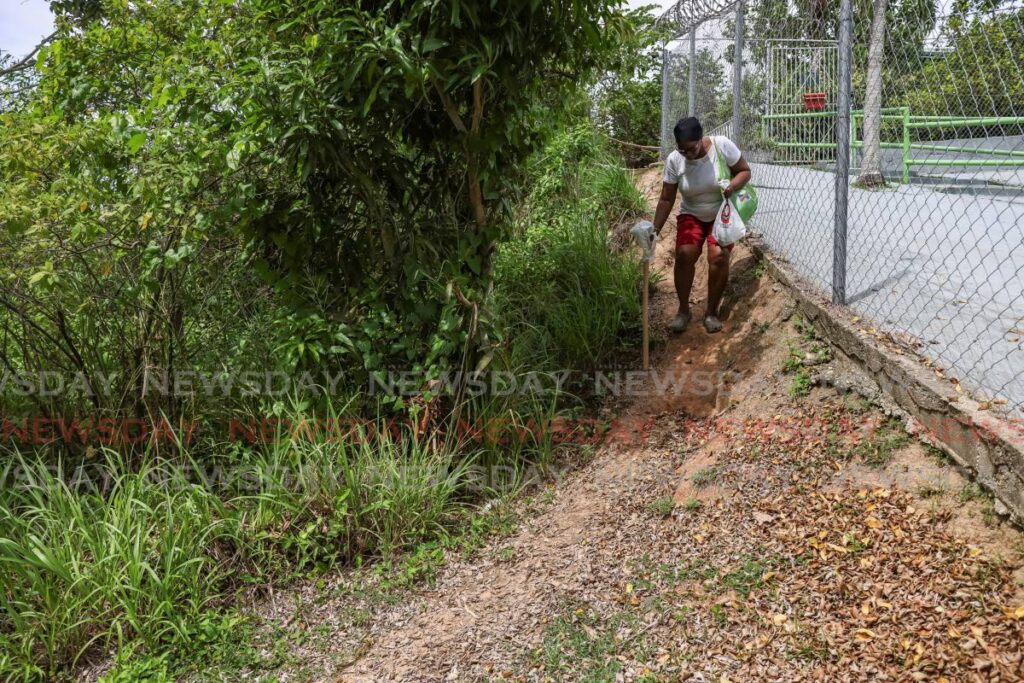
"But this is something that is beyond our control. So we asking the government for their assistance in whatever way. Come and say something, come and see where the people live, come and see what the people have to go through and see Cedros."
She said the community was a quiet one that was did not protest or block roads to get attention.
"We just asking peacefully that somebody with a good heart could come back to Cedros and try to make a difference for the people, because it have other people will lose their houses sometime down the road, and it hard to see that all your livelihood just going down."
Sunday Newsday called and sent questions to Minister Sinanan on November 21 and 22, but there was no response.



